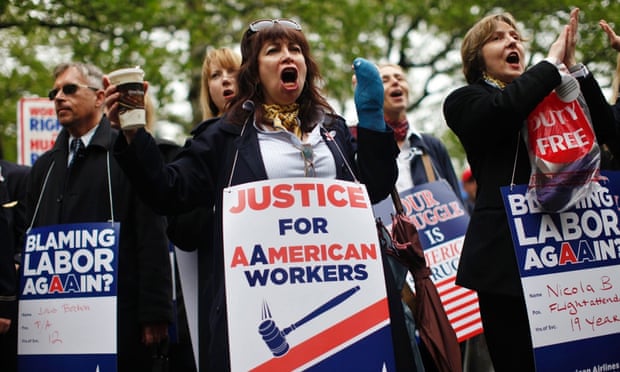Right-to-work laws are every Republican union-hater's weapon of choice
X post in Labor & GD
http://www.theguardian.com/commentisfree/2015/feb/10/right-to-work-laws-are-every-republican-union-haters-weapon-of-choice
Michael Paarlberg
Anti-union laws don’t help the economy, don’t create jobs and don’t end ‘compulsory union membership’. They can only kill off unions

Organized labor is not the enemy. Politicians who want to eliminate any and all protections for workers under the guise of individual freedom are. Photograph: MIKE SEGAR/REUTERS
Tuesday 10 February 2015 06.30 EST
There are few crusades in American politics more quixotic than bashing unions. They are a threat that exists mostly in the imaginations of their opponents: an all-powerful, resurgent labor movement that scares investors and imperils the economy, despite representing just 11% of the US workforce. Right-to-work laws are their weapon of choice.
Last week, the Supreme Court announced it would hear a case that could very well finish off American unions in the last bastion where they have any significant presence at all, the public sector. The case, Friedrichs v California Teachers Association, will decide if right-to-work laws (designed to bankrupt unions by encouraging employees who benefit from collective bargaining agreements to not pay for them) will extend to all public employees nationwide – an outcome Justice Samuel Alito has all but promised to deliver.
Lest you think such measures only target politically unpopular public sector unions, Illinois governor Bruce Rauner just announced he would create “right-to-work zones” for private businesses throughout the state, encouraging municipalities to follow Michigan and Indiana’s lead. Those two states were the latest to pass right-to-work laws in 2012, a remarkable shift in that last geographic stronghold of organized labor. Rauner contends that businesses, unshackled from the burden of union contracts, will rush to create jobs in Illinois communities – contrary to a University of Illinois study that found no such evidence for such a broad claim.
Economic arguments for right-to-work are, however, always highly speculative, proposing that the low-wage jobs that might be created by companies attracted by such laws would offset the very real, calculable income losses that inevitably accompany deunionization.
FULL story at link.
